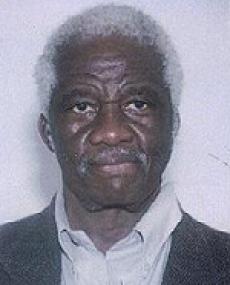
Mazisi Raymond Kunene was born in Durban on May 12, 1930, at McCord's Hospital. His mother Eva Kunene (nee Ngcobo) was a teacher and his father, Mdabuli Albert Kunene, a labourer.He grew up at Amahlongwa on the KwaZulu-Natal South Coast and attended primary school there and later Kwa-ahluzingcondo High. After matriculating in Marianhill, he obtained a teaching certificate at Maphumulo Teachers' Training College. He began writing at an early age and was published in newspapers and magazines from the age of 11.In 1956 he won the Bantu Literary Competition Award and earned a Masters degree in the Arts from the University of Natal in 1959 for a paper entitled “An Analytical Survey of Zulu Poetry, Both Traditional and Modern".He went to England on a scholarship from Christian Action in 1959,leaving on exit permit since he was denied a passport.
After a brief stint in Lesotho, Kunene travelled to Britain planning to do his doctorate but events overtook that ambition and he was drawn into liberation politics, becoming the ANC's chief representative in the UK and Western Europe in 1964.He served as the ANC's representative in London with responsibility for Europe and the Americans from 1962 to 1969,making several visits to the US and
He served in that capacity for a number of years before resuming his studies in the US, where he took up a post at the University of California, Los Angeles in 1973 where he taught for 19 years. He eventually became Professor of African Languages and Literature at that campus, a, post that he held until his return to South Africa in 1992.He also worked closely with leading ANC figures, including Moses Mabhida, Oliver Tambo and Robert Resha. After establishing the South African Exhibition Appeal in 1972, to raise funds for the ANC, Professor Kunene received resounding support from renowned figures of the art world including Picasso, Chagall, Giacometti and Rauschenberg. He also served as a Cultural Advisor to Unesco.
In 1993 Unesco made him Africa's poet laureate and he was named South Africa's Poet Laureate in March 2005. Inspired by the history of his people, especially their struggle for freedom and democracy against a brutal system of colonialism and apartheid, Kunene was before deeply rooted in the oral traditions and the indigenous literature of the Nguni and, Sotho speakers of Southern Africa. An African writer intellectual who was both cosmopolitan and national, he was esteemed for his craft by his contemporaries. He was also an uncompromising panÂAfricanist, espousing an African literary and cultural ethos.The decades of 1980s and 1990s were probably Kunene's most prolific. He produced eight major works, in both English and isiZulu, during this time. His three epics, Emperor Shaka the Great, 1979; Anthem of the Decade, 1981; and The Ancestors and the Sacred Mountain, 1982, were received with critical acclaim, establishing him as one of Africa's literary greats.
He was also famous for his Zulu version of Shakespeare's Macbeth, known as Mabatha. He published books in Zulu including Isibusiso sikamhawu (1994), Indida yamancasakazi (1995), Umzwilili wama-Afrika (1996) and Igudu likaSomcabeko (1997). In 1969, Kunene wrote an introductory essay to John Berger and Ann Bostock’s translation of Aime Cesaire’s Return to my Native Land. After his return to South Africa, Kunene lectured at the University of Natal until his retirement. The former University of Natal bestowed an honorary doctorate on Prof Kunene in recognition of his contribution to creative writing.Kunene passed away on August 11, 2006, and is survived by his wife Mathabo Kunene and his four children.